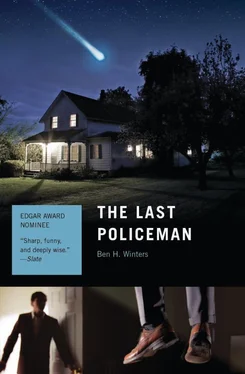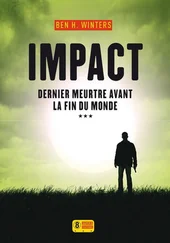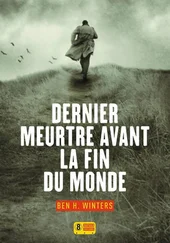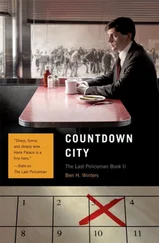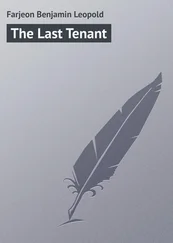As it turns out, Culverson was paying attention from his side of the room when I was on the phone yesterday, spinning my wheels in search of my sister’s village idiot of a husband. So, Culverson, he goes ahead and makes some calls of his own, God bless him, and because he’s a much better investigator than I will ever be, he cracked it.
“Detective,” I say. “I don’t know what to say.”
“Forget about it,” he says, still grinning. “You know me, I like a challenge. And also, before you thank me too much, take a look at what I found out.”
He slides the little piece of paper into my palm, and I read it and groan. We stand there for a second, Culverson grinning wickedly, Andreas in his corner watching his movie and wringing his sweaty hands together.
“Good luck, Detective Palace,” says Culverson, patting me on the shoulder. “Have fun.”
* * *
He’s wrong.
Andreas, I mean.
Along with this Borstner, the blogger or pamphleteer or whatever he is: the jackass in Arizona getting people’s hopes up.
There are many such characters, and they’re all wrong, and it’s irritating to me because Andreas has responsibilities, he has a job to do; the public is relying on him, just as they are on me.
Still, at some point, a few hours later, before I call it a day, I stop at his desk to watch the Jet Propulsion Lab video again. I lean forward, hunch forward really, and squint. There’s no swerve, no stop-start flicker in the animation that might credibly suggest an error in the underlying data. Maia does not jog or bobble on its course, it’s clear forward motion all the way. It just comes, on and on, unerring, as it’s been coming since long before I was born.
I can’t purport to understand the science, but I know that there are a lot of people who do. There are many observatories, Arecibo and Golds tone and the rest of them, there are a million or more amateur astronomers tracking the thing across the sky.
Peter Zell, he did understand the science, he studied it, he sat in his small apartment silently absorbing the technical details of what is happening, making his notes, underlining details.
I restart the video, watch the asteroid swing around one more time, speed up furiously in the homestretch, and then… bam!
“Roll through, please.”
The soldier’s chin is perfectly square, his eyes are sharp and cheerless, his face is cold and impassive beneath a wide black helmet, the minuteman logo of the National Guard emblazoned across the brim. He motions me forward with the tip of his firearm, which appears to be an M-16 semiautomatic. I roll through. This morning I reattached the snow chains, triple-checking the cable connects, drawing tight the slack. Thom Halburton, the department mechanic, said the car’ll drive just fine even with the dent, and so far it seems like he’s right.
I’m not even a half mile from downtown Concord, I can still see the spire of the state house in one direction and the Outback Steakhouse billboard in the other, but it’s a different world. Barbed-wire fences, one-story windowless brick buildings, a blacktop service road marked with white arrows and yellow arrows and stone pylons. Guard towers, green directional signs riddled with cryptic acronyms. More soldiers. More machine guns.
The IPSS Act is known to contain a raft of so-called black titles, classified sections generally assumed to relate to the various branches of the armed services. The exact content of those black titles is unknown—except, presumably, to its drafters, a joint House and Senate armed forces committee; to the military commanders and high-level officers of the affected branches; and to various relevant members of the executive branch.
But everyone knows, or at least everyone in law enforcement is fairly certain, that the organization of the United States military has been extensively revamped, its powers and resources expanded—all of which makes this the last place I would choose to be, on a gray and windy Friday morning when I’m hip-deep in a murder investigation: navigating my Chevrolet Impala through the headquarters of the New Hampshire National Guard.
Thanks, Nico. I owe you one.
I climb out of the Impala at the brig, a squat and windowless concrete building with a small forest of antennae bristling along the flat lines of its roof, at 10:43. Thanks to Culverson, and Culverson’s contacts, I’ve got five minutes, beginning at exactly 10:45 a.m.
A severe and charmless female reserve officer in green camouflage pants stares at my badge in silence for thirty seconds before nodding once and ushering me down a short hallway to a massive metal door with a small square Plexiglas window in its dead center.
“Thanks,” I say, and she grunts and heads back down the hallway.
I peer in the window, and there he is: Derek Skeve, sitting in the middle of the floor of his cell, cross-legged, breathing slowly and elaborately.
He’s meditating. For the love of God.
I make a fist and knock on the little window.
“Skeve. Hey.” Knock, knock. “Derek.”
I wait a second. I tap again.
“Hey.” Louder, sharper: “Derek.”
Skeve, eyes still closed, raises one finger of one hand, like a doctor’s receptionist busy on the phone. Rage boils in my cheeks, this is it, I’m ready to go home. Surely it’s better to let this self-involved doofus sit in military prison aligning his chakras until Maia gets here. I’ll turn around, say “thanks anyway” to the charmer at the door, call Nico and give her the bad news, and get back to work finding Peter Zell’s killer.
But I know Nico, and I know myself. I can tell her whatever I feel like, I’ll just end up driving back out here tomorrow.
So I bang on the window again, and at last the prisoner unfolds himself and stands. Skeve is in a tan jumpsuit with NHNG stenciled across the front, an incongruous complement to his long, matted ropes of hair, those ridiculous Caucasian dreadlocks that make him look like a bike messenger—which in fact he has been, among many other short-lived quasi-professions. Several days’ growth of fuzz coat his cheeks and chin.
“Henry,” he says, smiling beatifically. “How are you, brother?”
“What’s going on, Derek?”
Skeve shrugs absently, as if the question doesn’t really concern him.
“I am as you find me. A guest of the military-industrial complex.”
He looks around at the cell: smooth concrete walls, a thin and utilitarian bunk bed bolted to one corner, a small metal toilet to the other.
I lean forward, filling the small window with my face. “Can you expand on that, please?”
“Sure. I mean, what can I tell you? I’ve been arrested by the military police.”
“Yes, Derek. I see that. For what?”
“I think the charge is operating an all-terrain vehicle on federal land.”
“That’s the charge? Or you think that’s the charge?”
“I believe that I think that is the charge.” He smirks, and I would smack him if it were physically possible, I really would.
I step away from the window, take a deep calming breath, and look at my watch. 10:48.
“Well, Derek. Were you, in fact, operating an ATV on the base for some reason?”
“I don’t remember.”
He doesn’t remember. I stare at him, standing there, still smirking. It’s such a fine line with some people, whether they’re playing dumb or being dumb.
“I’m not a policeman right now, Derek. I’m your friend.” I stop myself, start again. “I’m Nico’s friend. I’m her brother, and I love her. And she loves you, and so I’m here to help you. So start at the beginning, and tell me exactly what happened.”
“Oh, Hank,” he says, like he pities me. Like my entreaties are something childish, something he thinks is cute. “I seriously wish that I could.”
Читать дальше
